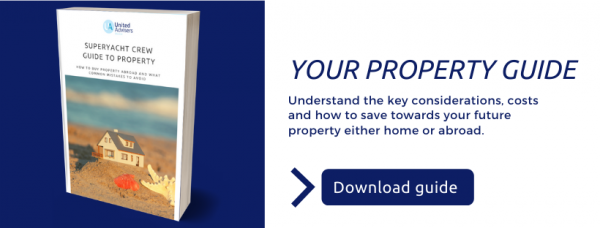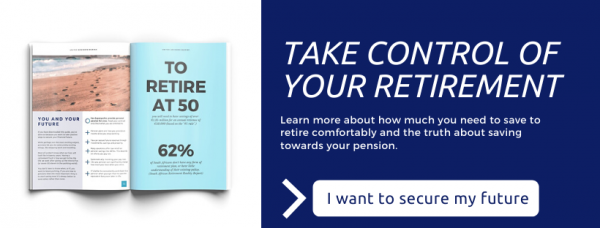30th Jul 2020
Common Superyacht crew finance questions
One of the many things we enjoy about our work is helping Superyacht crew to understand the world of personal finance.
We receive a lot of questions from crew, especially when it comes to things like where they must pay tax, the best bank accounts for crew and making sound investments.
Below are some of the most common questions we are asked by Superyacht crew – we hope you find it useful.
What are my tax obligations as a crew member working onboard a Superyacht?
The country in which you must pay tax on your earnings, known as your tax location, may not necessarily be the same country in which you’re a resident. It’s important to know where (and when) to pay tax to avoid falling foul of tax authorities. If you are unsure of your tax location, speak to one of our experienced tax partners.
Once you are aware of your tax location and obligations, make sure you understand what tax advantages exist for Superyacht crew.
For example, the Seafarers Earnings Deduction (SED) is an allowance that helps UK taxpayers working in the Superyacht industry significantly reduce their tax bill. With the help of our tax partners, SK Tax, we’ve provided answers to the most commonly asked questions from crew when it comes to the SED.
Keeping your tax affairs in order can also help you save money, which is why we wrote the UK Crew Guide to Savings, Pensions and Tax.
For South African crew, tax issues can be a little more complicated. Some South African yacht crew incorrectly believe that because they have not registered for tax at the South African Revenue Services (SARS), they are not liable to pay any taxes in South Africa.
That is not the case and we strongly encourage all South African crew to read about changes introduced in early 2020, which effectively introduced an ‘expat tax’.
UA/BFMI are not tax advisers and clients should always seek independent tax advice for their individual circumstances.
What are equities?
When referring to the stock market, equities are simply shares in the ownership of a company. If you own equities as part of your investment portfolio, the value of your holdings increases when the shares you own become worth more than what you paid for them.
Equities are an attractive investment option because of their potential for high returns. Also, companies pay dividends out of their own profits and into the pockets of their shareholders. When available, dividends on shares can provide major benefits.
However, regular dividends are not guaranteed nor are high returns. It all depends on the action of the stock market. And keep in mind that when it comes to equities, the goal is for a stable return over a long-term investment. Shares prices do fluctuate, so you need to be prepared that they may have lower value when you cash them in.
Before making a decision about whether to invest in equities, it’s best to speak with a financial adviser. They will help determine your level of risk based on your circumstances and whether investing in equities is a wise decision as part of your personal financial plan.
What is the best bank account for crew?
The most popular bank account for Superyacht crew is a Standard Bank Seafarer account because of the ability to manage multiple currencies, with a bank card dedicated to each currency account, and the ability to open an account without a large deposit nor a sizeable guaranteed salary. This is especially advantageous for crew just starting out in the industry.
However, other options exist thanks to increased popularity of online banking and a much more flexible foreign exchange market. We’ve looked at the pros and cons of some of the ‘free’ online bank account options available to Superyacht crew
I’m looking to invest in property. As crew, where should I buy?
We’ll start by saying that property investments should always be made with your head, and not your heart. There are many things to consider before making your choice. For example: your short-term plan for the property (e.g. holiday rental), your long-term plan (e.g. long-term rental or your future home base), your budget, mortgage availability, potential rental yield and your exit strategy if you wish to sell.
There isn’t one country where it’s best to buy property. For example, the cost of buying in London may be prohibitive and, if possible, will likely never provide the rental returns you need. Buying a cheap property in a fashionable developing country, on the other hand, may seem attractive, but the risks may be higher due to reasons including political unrest and crashing currencies.
Most importantly, if you buy property as an investment, you need to ensure you calculate returns based on the total cost of ownership, not just the mortgage repayments.
When it comes to buying property abroad, there are even more factors to consider. For example, you may need to be a permanent resident before you can buy a property.
Buying a property can – and should – be an exciting time. However, the road to property ownership is often paved with challenges, which is why we wrote the Superyacht Crew Guide to Property.
What is cryptocurrency and should I invest in it?
The simplest definition of cryptocurrency is ‘digital currency’. A more technical definition is: ‘systems, or networks, based on blockchain technology that allow for secure payments online using tokens’. The first and most often-quoted cryptocurrency is Bitcoin.
There are now thousands of other cryptocurrencies and some people invest in them as a way to boost their savings. However, the cryptocurrency market is highly volatile and therefore high-risk. Cryptocurrencies also face a lot of criticism, namely for their use for illegal activity, exchange rate volatility and vulnerabilities of their underlying infrastructure. Alternatively, cryptocurrencies have been praised for their portability and ease with which they can be transferred between two parties without the need for a trusted third party (e.g. a bank or credit card company). Although that second point is the reason why cryptocurrency is often associated with illegal activity.
We don’t normally advise investing in cryptocurrencies, but we know that they are of interest to some yacht crew. Our advice is not to invest based on the hype and noise and do your homework. The worst thing you can do is put your money into options you know little or nothing about.
When it comes to investing, what investment platforms should I use?
An investment platform – also known as a fund platform – is an online service that allows you to buy, sell and hold investments in things like bonds and stocks. You can do this yourself, via a direct-to-consumer platform, or via a financial adviser who will invest on your behalf.
If you wish to invest yourself, do your research as there is no one-size-fits-all investment platform. It depends on your circumstances; how much you’re willing to invest and your tolerance for risk. Platforms also come with fees, so make sure you’re aware of what you may need to pay in addition to the amount you wish to invest.
As independent advisers, we have access to multiple investment platforms and savings vehicles such as investment bonds. Before recommending the most appropriate investment options for you, we take into account things like your financial goals and your savings plan.
Depending on whether your savings plans are short term (0–5 years) or long term (5–10+ years), we may recommend a mix of investment platforms and savings vehicles.
What should I do about a pension?
There are ongoing debates in the industry when it comes to pensions for yacht crew. Some believe it’s the responsibility of the employer to pay into a pension fund while others believe it’s entirely up to crew members to fund their future retirement. These differing views were echoed in our 2020 Superyacht Crew Financial Wellbeing Survey.

We know from speaking with crew that many don’t feel supported enough when saving towards their retirement. As a result, crew often worry about their financial future.
When it comes to saving for your future, the best thing to do is make a start and start saving now. Whatever your situation, make time to regularly review your finances and savings goals and work out how much of your crew salary you can save every month.
What’s the point of having an emergency fund?
Having a stash of money set aside as a financial safety net is crucial for when you suddenly find yourself without a job. It allows you to live securely and stress-free without an income for a period.
But having an emergency fund is also more than that: it is one of the most important things you can do as part of your savings plan. Putting money aside in an account that isn’t your day-to-day bank account can prevent you from spending money on a whim.
It’s never too late to build your emergency fund. Review your expenses and work out where you can cut back to start saving on a regular basis. You will be surprised just how quickly it can add up. It might even give you the savings bug and stop you wanting to spend.
What is compound interest?
Compound interest refers to a method of continually reapplying interest to a principal (the original sum of money put into savings or an investment) that is growing over time. This calculation of interest is present on virtually all credit card and loan payments where a debt grows with each unpaid billing cycle. That’s when compound interest works against you. However, it can work to your advantage when applied to your savings and investments.
Put simply, compound interest is interest on interest, which is a powerful financial force when allowed to accumulate over a long period of time. And the good news is you don’t need to start with large amounts of money. Compound interest puts your hard-earned money to work and grows larger as it feeds on itself.
Why get an adviser if I can manage my own finances?
If you have the knowledge, motivation and time to manage your own finances, there’s nothing stopping you from doing just that. But be honest with yourself: do you enjoy reading about financial topics like taxes, investing and loans? Do you have the time to do the necessary homework? Are you confident about planning your financial future?
When it comes to considering future financial goals, most people want someone to understand their current situation and their life goals. Someone who can articulate how they get from where they are now, to where they need to be.
We know that crew want clarity about their financial futures and a service that relates their life plans to a financial plan. A good financial adviser will do this by supplying a comprehensive roadmap which realises the lifestyle they want to achieve or maintain. And in the Superyacht industry, a good financial planner will have the answers to the finance questions often asked by crew because of their experience in the industry.
We specialise in providing financial advice to busy yacht crew. In fact, some of us are ex-crew, so we know time is often in short supply to organise your personal finances. That’s why we make it easy for crew and do the time-intensive work behind-the-scenes (or below the sea!).

What fees do financial advisers charge?
Independent financial advisers have a responsibility to offer you the best advice tailored to your situation and to be transparent about fees.
Any fees they charge will potentially depend on where they are regulated and their business model in regard to remuneration for their services.
What is important is to understand what exactly you will be paying for and to determine whether that meets your expectations. Any chargeable fees should be explained fully prior to signing any documentation.
When meeting with a financial adviser for the first time, ask them about their fees. Transparency is essential and will lead to a much more trustworthy relationship.
If you would like to understand how we charge for our services, please get in touch. We will be happy to explain how our business model works.





